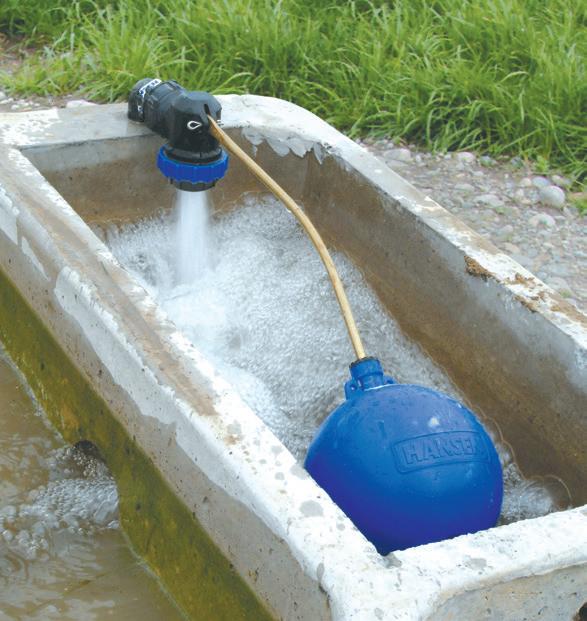
3 minute read
Choosing the right trough valve
by Ruralco
So, will any old trough valve suit my needs? Definitely not!
WORDS AND IMAGES SUPPLIED BY HANSEN
Advertisement
Trough valves are needed to allow water to fill a trough, then turn off the flow before the trough overflows. In some situations the trough valve also indirectly controls the pump, telling it when to turn on and off, so it is a very important part of any water system. In New Zealand there are three common types of trough valves: 1. Sleeve valve
Piston travels horizontally (Hansen Mini
Fast-Flo Valve & Hansen Fast-Flo Valve); 2. Piston Valve
Piston travels vertically up and down (Hansen Super-Flo Valve); 3. Diaphragm Valve
All have a rubber diaphragm internally that opens and closes to allow water through the valve (Hansen Max-Flo
Valve). When designing a water system, a good designer will take into account the flow required at the trough valve, as this will help them to determine the correct valve for the application. The flow rate is determined by the number and type of stock that you are trying to supply water to. The best design will usually be one that provides the correct flow at the lowest pressure, excess pressure is not required in water systems as it can cause a host of other issues. Some farms could have all three types of valves on the same water system. Hansen make all three types of trough valves and have established themselves as a market leader. Typically the sleeve valves have been associated with lower flow requirements such as lifestyle blocks and smaller sheep farms, however due to its increased flow the Hansen Fast-Flo can be used in a wide range of applications such as sheep and beef, deer, goats, calf rearing. The Hansen Mini Fast-Flo is perfect solution for small bowl feeders and inquisitive stock like horses. Piston valves have been associated with sheep, beef, dairy, and deer. Piston valves tend to stick open or shut over a period of time. The Hansen Super-Flo valve addresses this problem by having a built in flushing system that works every time the valve is openend. The piston and sleeve valves are closed purely by leverage so using the correct size ball float is crucial. Where possible you should always use a large ball float. Diaphragm valves are most commonly associated with higher flow requirements such as dairy farming, or larger sheep and beef herds. Typically diaphragm valves have been problematic due to their design, which has required an inline filter to protect the internal components from damage. This filter creates a large restriction, reducing flows. The Hansen Max-Flo Trough Valve has addressed this issue by not requiring an inline filter of any sort . The Max-Flo has a self cleaning feature which allows it to handle dirty water. Not all troughs are built the same, so this will also play a part in the correct valve selection. Obviously the valve needs to fit in a given space. Hansen have all bases covered with multiple combinations for every valve, ie long arm, short arm, ezi bend arm, big float, small float, long adaptors, short adaptors, cord operated. This allows for top entry, side entry and also bottom entry troughs. All trough valves require maintenance. This should not be overlooked and often it is as simple as just looking at the valve to see if it is leaking. If it is, fix it early, it may just be that something is fouling the seat area of the valve, or slightly worse it could be a damaged seal, either way its an easy fix and all Hansen valves can be purchased in individual parts at any stockist of Hansen Products. So there you have it. The trough valve is not just the bit at the end of the system, it’s a vital part of any stock water system, helping to determine the good health of your stock. Just like buying a Bull or a Ram, choose the correct trough valve and you will get years of trouble free service. For more information visit your local Ruralco store.











